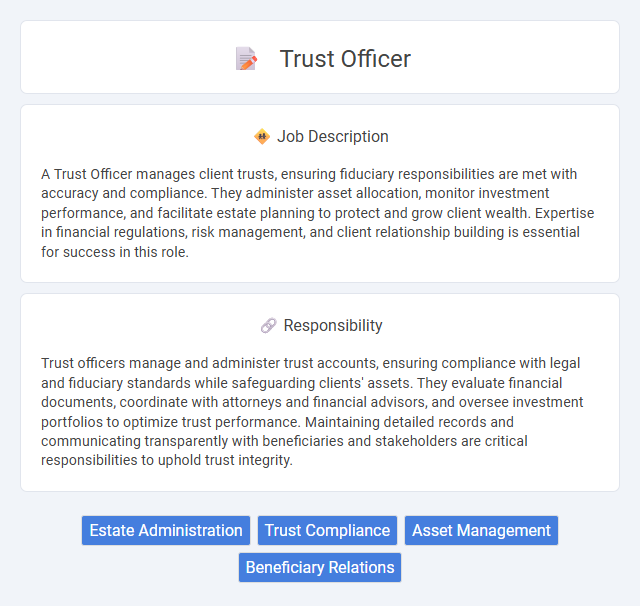
A Trust Officer manages client trusts, ensuring fiduciary responsibilities are met with accuracy and compliance. They administer asset allocation, monitor investment performance, and facilitate estate planning to protect and grow client wealth. Expertise in financial regulations, risk management, and client relationship building is essential for success in this role.
Individuals with strong analytical skills, attention to detail, and a high level of integrity are likely to be suitable for a trust officer role. People who are comfortable managing complex financial matters and maintaining confidentiality probably fit well in this position. Those who exhibit patience and excellent communication abilities are more likely to succeed in building client trust and handling fiduciary responsibilities effectively.
Qualification
A Trust Officer typically requires a bachelor's degree in finance, accounting, law, or business administration, with many employers preferring a Certified Trust and Financial Advisor (CTFA) designation. Strong knowledge of trust laws, estate planning, investment management, and fiduciary responsibilities is essential for managing client assets effectively. Experience in financial services, excellent analytical skills, and proficiency in risk assessment further enhance qualifications for this role.
Responsibility
Trust officers manage and administer trust accounts, ensuring compliance with legal and fiduciary standards while safeguarding clients' assets. They evaluate financial documents, coordinate with attorneys and financial advisors, and oversee investment portfolios to optimize trust performance. Maintaining detailed records and communicating transparently with beneficiaries and stakeholders are critical responsibilities to uphold trust integrity.
Benefit
Trust officer roles probably offer benefits such as competitive salaries and comprehensive health insurance plans, which help attract skilled professionals. Opportunities for retirement savings through 401(k) plans or pensions may be available, providing financial security over time. Employers likely provide professional development and networking opportunities, enhancing career growth and job satisfaction.
Challenge
A trust officer's role likely involves navigating complex legal and financial regulations, requiring strong analytical skills and attention to detail. Balancing client expectations with fiduciary responsibilities may present frequent ethical and decision-making challenges. The evolving nature of financial markets might demand continuous learning and adaptability to ensure asset protection and growth.
Career Advancement
A trust officer manages fiduciary accounts, ensuring compliance with legal and financial regulations while providing personalized asset management and estate planning services. Career advancement opportunities include progressing to senior trust officer roles, trust department manager, or chief fiduciary officer, often requiring certifications such as Certified Trust and Financial Advisor (CTFA). Mastery of financial analysis, regulatory knowledge, and client relationship management are critical for higher-level positions within banking and wealth management institutions.
Key Terms
Estate Administration
A Trust Officer specializes in estate administration by managing and distributing assets according to the terms of wills and trusts, ensuring compliance with legal and tax regulations. They coordinate with beneficiaries, legal advisors, and financial institutions to execute estate plans efficiently and safeguard the interests of all parties involved. Expertise in probate processes, fiduciary responsibilities, and asset valuation is essential for effective estate administration in trust management.
Trust Compliance
Trust officers specializing in trust compliance ensure adherence to legal regulations and fiduciary duties in managing client assets and estates. They conduct thorough audits, monitor trust activities for regulatory compliance, and implement policies to mitigate risks related to trust administration. Expertise in tax laws, anti-money laundering regulations, and estate planning is essential for maintaining trust integrity and protecting client interests.
Asset Management
Trust officers specialize in asset management by overseeing and administering trust funds, estates, and investment portfolios to ensure clients' financial goals are met. They manage diversified assets, including real estate, stocks, bonds, and other financial instruments, while maintaining fiduciary responsibility and compliance with legal regulations. Their expertise in portfolio management, risk assessment, and tax planning helps optimize asset performance and preserve wealth for beneficiaries.
Beneficiary Relations
A trust officer specializing in beneficiary relations manages communication and coordination between trust beneficiaries and the financial institution. They ensure accurate disbursement of trust assets while addressing beneficiary inquiries and resolving disputes efficiently. Expertise in estate planning, fiduciary responsibilities, and regulatory compliance is essential to maintain trust and protect client interests.
 kuljobs.com
kuljobs.com